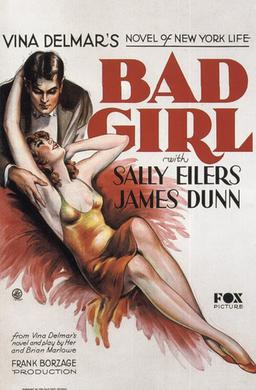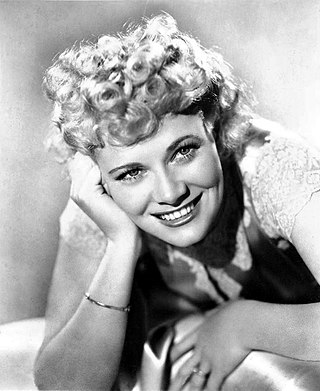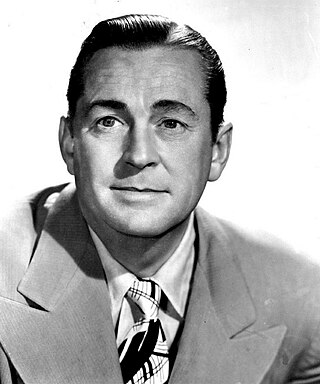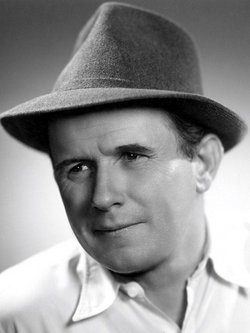Related Research Articles

Bad Girl is a 1931 American pre-Code drama film directed by Frank Borzage and starring Sally Eilers, James Dunn, and Minna Gombell. The screenplay was adapted by Edwin J. Burke from the 1928 novel by Viña Delmar and the 1930 play by Delmar and Brian Marlowe. The plot follows the courtship and marriage of two young, working-class people and the misunderstandings that result from their not having learned to trust and communicate with one another. The film propelled then-unknown actors Eilers and Dunn to stardom. It was nominated for three Academy Awards, including Best Picture, and won for Best Director and Best Adapted Screenplay.

Dennis O'Keefe was an American actor and screenwriter.

Penny Singleton was an American actress and labor leader. During her 6 decade career on stage, screen, radio and television, Singleton appeared as the comic-strip heroine Blondie Bumstead in a series of 28 motion pictures from 1938 until 1950 and the popular Blondie radio program from 1939 until 1950. Singleton also provided the voice of Jane Jetson in the animated series The Jetsons from 1962 to 1963.

James Howard Dunn, billed as Jimmy Dunn in his early career, was an American actor and vaudeville performer. The son of a New York stockbroker, he initially worked in his father's firm but was more interested in theater. He landed jobs as an extra in short films produced by Paramount Pictures in its Long Island studio, and also performed with several stock theater companies, culminating with playing the male lead in the 1929 Broadway musical Sweet Adeline. This performance attracted the attention of film studio executives, and in 1931, Fox Film signed him to a Hollywood contract.

Edward James Begley Sr. was an American actor of theatre, radio, film, and television. He won an Academy Award for Best Supporting Actor for his performance in the film Sweet Bird of Youth (1962) and appeared in such classics as 12 Angry Men (1957), Odds Against Tomorrow (1959) and The Unsinkable Molly Brown (1964). He was nominated for an Emmy Award for his portrayal of Matthew Harrison Brady in a television adaptation of Inherit the Wind. He is the father of the actor and environmental activist Ed Begley Jr.

Julius "Jules" Dassin was an American film and theatre director, producer, writer and actor. A subject of the Hollywood blacklist, he subsequently moved to France, and later Greece, where he continued his career. He was a member of the Academy of Motion Picture Arts and Sciences and the Screen Directors' Guild.

Vanessa Brown was an Austrian-born American actress who worked in radio, film, theater, and television.

John Howard Payne was an American film actor who is mainly remembered from film noir crime stories and 20th Century Fox musical films, and for his leading roles in Miracle on 34th Street and the NBC Western television series The Restless Gun.

William Taylor "Tay" Garnett was an American film director, writer, and producer. He made nearly 50 films in various genres during his 55-year career, The Postman Always Rings Twice and China Seas being two of the most commercially successful. In his later years, he focused mainly on television.

Patrick Barry Sullivan was an American actor of film, television, theatre, and radio. In a career that spanned over 40 years, Sullivan appeared in over 100 movies from the 1930s to the 1980s, primarily as a leading actor after establishing himself in the industry, and later as a character actor.

Ed Gardner was an American comic actor, writer and director, best remembered as the creator and star of the radio's popular Duffy's Tavern comedy series.

Helen Mack was an American actress. She started her career as a child actress in silent films, moving to Broadway plays and touring one of the vaudeville circuits. Her greater success as an actress was as a leading lady in the 1930s. She made the transition to performing on radio and then into writing, directing, and producing shows during the Golden Age of Radio. She later wrote for Broadway, stage and television. Her career spanned the infancy of the motion picture industry, the beginnings of Broadway, the final days of vaudeville, the transition to sound movies, the Golden Age of Radio, and the rise of television.

Marie Wilson was an American radio, film, and television actress. She may be best remembered as the title character in My Friend Irma.
Donald Ritchie Taylor was an American actor and film director. He co-starred in 1940s and 1950s classics, including the 1948 film noir The Naked City, Battleground, Father of the Bride, Father's Little Dividend and Stalag 17. He later turned to directing films such as Escape from the Planet of the Apes (1971), Tom Sawyer (1973), Echoes of a Summer (1976), and Damien - Omen II (1978).

Charles Meredith was an American stage, film, and television actor, who also directed plays and taught in college drama departments. His screen career came in two widely separated phases: as a leading man for silent films in the early 1920s, and as a character actor for films and television from 1947 through 1964. He was a series regular on television shows Rocky Jones, Space Ranger and The Court of Last Resort.
Brian Kerwin is an American actor who has starred in feature films, Broadway shows, and television series and movies.
In the Name of the Law is a 1922 American silent melodrama directed by Emory Johnson with Dick Posson acting as assistant director. FBO released the film in August 1922. The film's "All-Star" cast included Ralph Lewis, Johnnie Walker, and Claire McDowell. The cast also included Johnson and his wife, Ella Hall. Emilie Johnson, Johnson's mother, wrote both the story and screenplay. In the Name of the Law was the first picture in Johnson's eight-picture contract with FBO.

Shaindel Kalish was an American actress on stage, on old-time radio, and in films. Her first name was sometimes spelled "Scheindel". She was also known at various times as Judith Blake, Ann Shepherd, Ann Preston, Judith Preston Blake, Ann S. Sheps, and Ann Shepherd Mann. She was a victim of the Hollywood Blacklist.

Margherita Maria Francesca LaCentra was an American contralto singer, best known for her work on old-time radio and her singing with Artie Shaw's orchestra. She also performed as Barbara Fulton.
Rowena Dolores Heath, also known as Dodie Heath and Dody Heath, was an American actress of stage, film, and television.
References
- 1 2 3 "Leonard Louis Levinson". Internet Broadway Database. The Broadway League. Archived from the original on April 7, 2023. Retrieved December 15, 2023.
- ↑ "Funeral Slated For N. Levinson, Ex-Store Owner". Los Angeles Evening Citizen News. May 22, 1950. p. 13. Retrieved December 17, 2023– via Newspapers.com.
- 1 2 3 4 5 Steinhauser, Si (November 18, 1941). "Famed L's Of Radio Born Here". The Pittsburgh Press. p. 36. Retrieved December 16, 2023– via Newspapers.com.
- 1 2 3 4 "Leonard Levinson, Radio Writer, Dies" . The New York Times. February 2, 1974. p. 32. Retrieved December 15, 2023.
- ↑ "News Notes". Los Angeles Evening Post-Record. June 13, 1925. p. 17. Retrieved December 16, 2023– via Newspapers.com.
- ↑ "L. L. Levinson joins advertising staff". Los Angeles Evening Post-Record. April 25, 1934. p. 5. Retrieved December 17, 2023– via Newspapers.com.
- 1 2 3 Ellett, Ryan (November 2, 2017). Radio Drama and Comedy Writers, 1928-1962. McFarland. p. 125. ISBN 978-1-4766-2980-3 . Retrieved December 16, 2023.
- ↑ "Leonard Levinson To Pass Up Big Air Coin For Radio War Work". Variety. July 1, 1942. p. 30. Retrieved December 17, 2023.
- ↑ "Daytime - Interview Programs". Ross Reports. May 1951. p. 36. Retrieved December 20, 2023.
- ↑ "Tuesday, November 14". Ross Reports. November 12, 1950. p. 4. Retrieved December 20, 2023.
- 1 2 Niemeyer, Harry (December 11, 1947). "He's Fast Character With a Gag". St. Louis Post-Dispatch. p. 2 D. Retrieved December 16, 2023– via Newspapers.com.
- ↑ "Republic to Release Impossible Series". Boxoffice. May 15, 1948. p. 18. Retrieved December 20, 2023.
- ↑ "Levinson - His Pictures Are Impossible". The Akron Beacon Journal. December 12, 1949. p. 5 B. Retrieved December 18, 2023– via Newspapers.com.
- ↑ Goodman, Ezra (May 29, 1949). "Strange Odyssey: Being an Account of a Film Premiere on A Streetcar Named 'Impossible'" . The New York Times. p. X 4. Retrieved December 19, 2023.
- ↑ Felker, Helen (April 2, 1972). "Quote a Book". The News Tribune. Washington, Tacoma. p. 11. Retrieved December 18, 2023– via Newspapers.com.